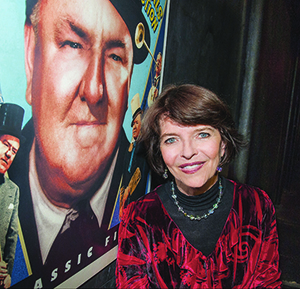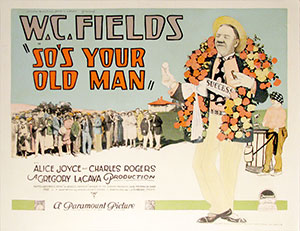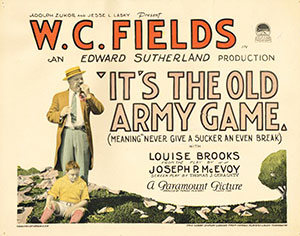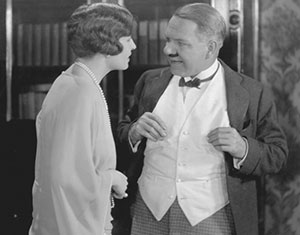
Dr. Harriet Fields, granddaughter of W.C. Fields, will be sharing her stories of the film legend at a special showing of his film this Sunday at the Somerville Theatre.
— Photo © Steve Friedman 2015
By Jim Clark
“If I can make them laugh and through that laughter make this old world seem just a little brighter, then I am satisfied.” These are the words of one of Hollywood’s most successful and beloved legends, W.C. Fields.
Throughout those many decades when he performed both on stage and film, he did that very thing, bringing forth laughter and making this old world so much brighter.
Fields’ work will be honored this weekend as the Somerville Theatre hosts a special showing of some of his classic films. Attending and speaking at the event will be his granddaughter, Dr. Harriet Fields. She will be talking through a double-feature presentation of the silent classics, So’s Your Old Man and It’s The Old Army Game, both co-starring flapper it-girl Louise Brooks.
The special event, featuring live musical accompaniment by Jeff Rapsis, takes place this Sunday, July 10 at 2:00 p.m. as part of the theater’s “Silents Please” film series which brings the magic of the pre-talkie era back to life.
The W.C. Fields event was put together by Dr. Harriet A. Fields and Jeff Rapsis after they met at The Library of Congress Film Festival, W.C. Fields Tribute To 100 Years In Film in November of last year. After a successful first run of the program, it was decided to bring the event to Somerville.
 Although she stresses that it is not her “day job,” as Vice President and Director of W.C. Fields Productions, Dr. Fields is kept busy keeping the memory of W.C. alive and preserving his work and standing as one of the great entertainers of the 20th century.
Although she stresses that it is not her “day job,” as Vice President and Director of W.C. Fields Productions, Dr. Fields is kept busy keeping the memory of W.C. alive and preserving his work and standing as one of the great entertainers of the 20th century.
“A year ago, on June 22nd, it was a hundred years and one day since W.C. Fields opened and starred in the Ziegfeld Follies,” Dr. Fields reminisces. “They had a beautiful, beautiful tribute to him at the New Amsterdam Theater, which is where the Ziegfeld Follies was on West 42nd St., just west of Broadway and 7th Ave. And in the lobby of that theater is a photo of W.C. Fields, Flo Ziegfeld, Fanny Brice, Will Rogers, and a few others. It sort of shows that W.C. is rooted in theater, in Broadway history. He performed throughout the world, and then he ended up on Broadway and he’d go across the river to the Astoria Studios and do some silent films.”
W.C. was at the Ziegfeld Follies for 10 years, 1915 to 1925. “All those ten years when W.C. was perfecting his act on Broadway that he had tried out in vaudeville all over the world, in every continent, except Antarctica” Dr. Fields explains. “He actually met Will Rogers in South Africa when they were performing. Then they happened to reunite again in the Ziegfeld Follies on Broadway, and then again out in the talkies in Hollywood. And they just had an incredibly strong bond and friendship.”
“In 1930, when W.C. was 50 years of age, he took a huge risk and went off to Hollywood. Talkies were just coming up then and he didn’t know how his voice would translate,” according to Dr. Fields. “But of all the comedy icons, W.C. was the only one to succeed in talkies. Charlie Chaplin didn’t, nor Buster Keaton or Harold Lloyd.” Very ironic, considering how iconic W.C. Fields’ voice is in the pantheon of classic film stars.

Dr. Fields is a more than willing participant in these events. “I always consider that just by mere happy accident of birth it’s my responsibility to make sure that younger generations, and generations to come, know W.C. Fields.”
The former Librarian of Congress who recently retired, Dr. James Billington, once told Dr. Fields, with tears in his eyes, that W.C. Fields is the icon of American culture and humor. “And just by happy chance, I have become the vehicle to spread the word.”
Dr. Fields’ first exposure to her grandfather’s work took place as she watched his film on television, sitting alongside her father, William Jr. “He looked exactly like his father. It was always strange for a young child to try to figure out where reality should begin,” she explains. “Here in this box is this man who looks just like this man who’s sitting right next to you.”
But as an adult, Dr. Fields is resolutely engaged in the work of preserving and advancing W.C.’s legacy. “Universal, for the most part, owns W.C. Fields’ films, but we consciously and very deliberately developed cordial relationships with them.” Accordingly, Universal reissued the films last year as part of the 100-year celebration. “This is a labor of love for us,” says Dr. Fields. “Our reward is to know that his legacy is known for generations to come.”
“I always say there is no instance in the human condition we cannot find some solace in the humor of W.C. Fields,” she asserts. “Whether it’s teenage children, difficult in-laws, marriage, work, and even death.” Such is the universality of W.C.’s characterizations.
“We inherited all of our grandfather’s artifacts and memorabilia,” says Dr. Fields. “The Library of Congress wanted it. The Smithsonian, and several schools throughout the country.” But they instead donated it for public viewing in Los Angeles. “If we had given it to the Library of Congress it would still be in boxes,” Dr. Fields jokes.
Dr. Fields has done professional work in Rwanda, and in her travels there she had occasion to participate in some special screenings of her grandfather’s work for film students, young people who had lived through terrible experiences of genocide and political upheaval. During a screening of It’s A Gift, Dr. Fields was taken by how much laughter the film evoked. “I asked them, what made you laugh throughout the film, and they said, ‘W.C. Fields is kind. The film is about family life. It’s about reality. W.C. Fields is patient, he never gets angry. ‘ And I though to myself, this is profound because they’re really talking about themselves. That country could have turned angry, but their model of reconciliation is to do better, to move forward, and all work together. And they saw that insight in W.C. Fields. Without a doubt, W.C. Fields’ work and art through humor is timeless. And I think more so than anyone.”
 Dr. Fields confirms that W.C. was indeed a kind and generous man. “We’ve talked with some of the people he performed with, like Margaret Hamilton and Grady Sutton and others, and they all said the same thing. W.C. Fields was the sweetest, nicest man.”
Dr. Fields confirms that W.C. was indeed a kind and generous man. “We’ve talked with some of the people he performed with, like Margaret Hamilton and Grady Sutton and others, and they all said the same thing. W.C. Fields was the sweetest, nicest man.”
Part of what Dr. Fields and her siblings inherited among W.C.’s memorabilia was comments on his scripts. “He was always defending what he thought were the lines the public would laugh at,” she says. “He was always really fighting with producers and directors because he maintained the integrity of his art, and he believed in that. And I admire that as well.
Dr. Harriet A. Fields, the only granddaughter of W.C. Fields, currently teaches Health Care Policy, but is an ardent advocate for her grandfather’s legacy.
Dr. Fields also has high praise for her collaborator, accompanist Jeff Rapsis, a regular participant in events at the Somerville Theatre. “To me, there’s about a half dozen people throughout the world who have this talent. They’ll look at a silent film – sometimes they’ve never seen it before – and they will have the piano or organ in front of them, or they’re with an orchestra, and they can pick up the sense and the emotions of what’s going on and from their brain to their fingers, to the piano. And then it comes to the audience and it’s just such a joy. It really enhances the experience of watching silent films. It’s lovely.”
Silents Please, the W.C. Fields double-feature presentation with guest speaker Dr. Harriet A. Fields, with musical accompaniment by Jeff Rapsis, takes place on Sunday, July 10 at 2:00 p.m. at the Somerville Theatre, 55 Davis Sq., Somerville. Admission is $15 adults and $12 for students and seniors.
Please visit www.wcfields.com for more information about the life and legacy of W.C. Fields.














Reader Comments